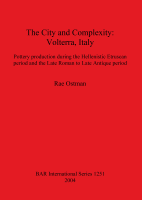Description
BOOK DESCRIPTION
Despite the great fascination that the collapse of past civilizations holds for the public, the process of decreasing social complexity has received surprisingly little attention from archaeologists, especially when compared to the voluminous research onincreasing complexity. And most studies of the process have been oriented toward understanding complexity by seeing how it fails, not toward understanding how a different, simpler society emerged from a more complex society. But if there are specific motivations and particular processes for decreasing complexityif collapse is a solution rather than a problem then clearly there is much to be learned from examining the societies that develop during periods of seeming decline. This research study examines how one complex society reorganized to a relatively simple society, recognizing the simultaneously constructive and destructive aspects of the process. The study focuses on the developments during the late Roman Empire through late Antiquity, a time of decreasing social complexity in the ancient Mediterranean world beginning in the late 2nd and continuing to the mid 6th centuries AD, on the basis of a detailed archaeological study of one city and its territory, Volterra, in Tuscany, Italy.











